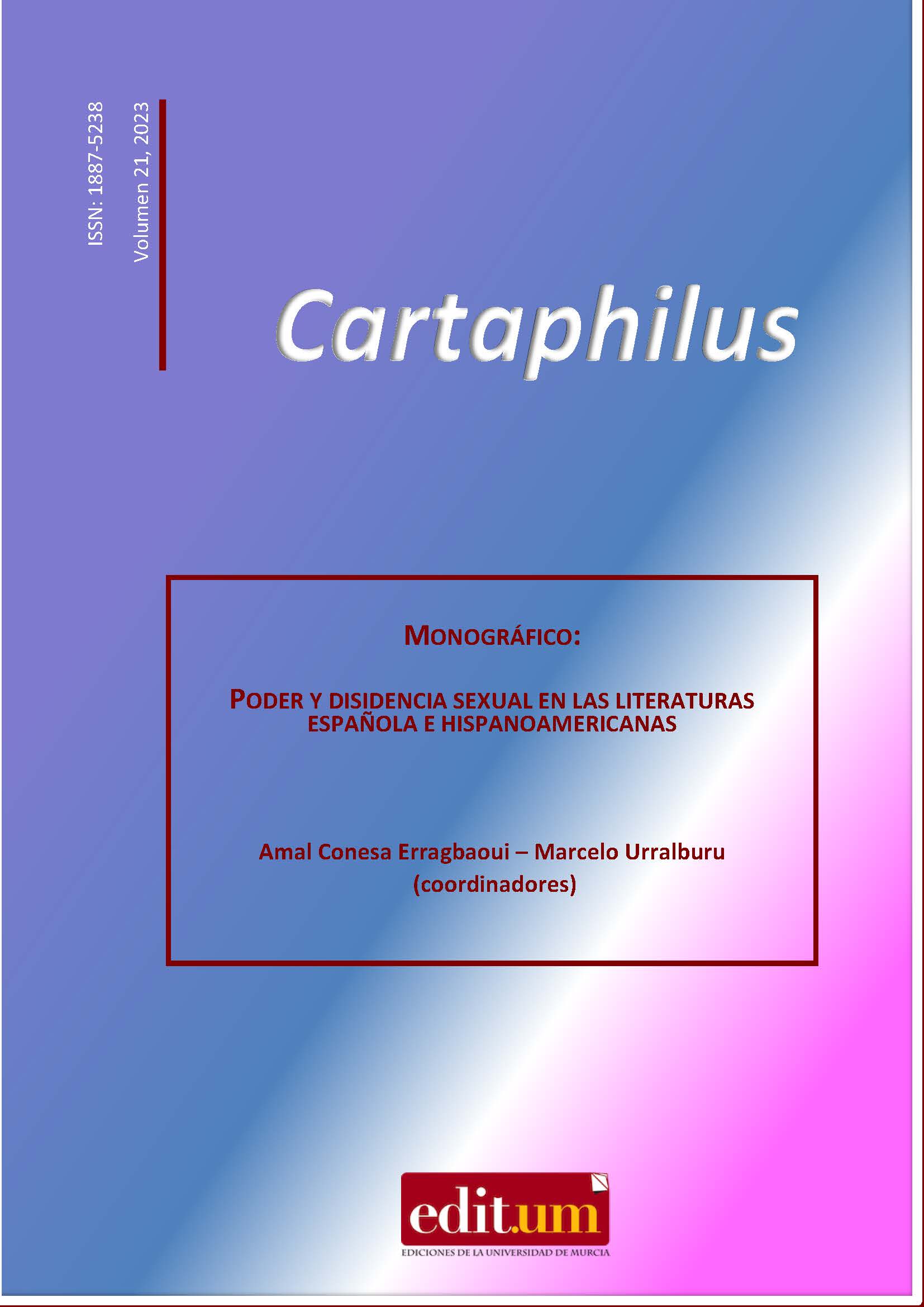The Discourse of Censorship and the Speculative Queermeneutics of Silence: the (In)Visibility of Safism in Postwar Spanish Narrative
Abstract
The motivation of this work arises from the concern to tentatively explore a genealogy of the sapphic representation in post-war Spanish literature. For this purpose, we intend to carry out a case study with four selected novels (Oculto sendero by Elena Fortún, Nada by Carmen Laforet, La colmena by Camilo José Cela and Entre visillos by Carmen Martín Gaite) where we will analyze the safism that is more or less explicitly included in them, implementing, where necessary, a speculative queermeneutics of silence from which we will project the sapphic potential upon the interpretative gaps of the text. Likewise, in order to evince the possible disappearance of female homosexuality in the narrative during the dictatorship, a comparison will be made with the representation of male homosexuality in them. This will allow us to evaluate whether the disappearance of homosexuality in post-war Spanish narrative was generalized or, on the contrary, especially implacable towards safism.
After the case studies, the results show an increasing tendency towards sapphic invisibility in the novels analyzed as we move into the midst of Francoist regime, a tendency that does not apply in the same way to male homosexuality. Given that the realistic novels of the Spanish postwar period can be interpreted almost as sociological capsules, the results confirm that, also in fiction, sapphism was non-existent or, often, it was hidden in the form of candid and innocent affection between girls.
Downloads
-
Abstract399
-
.pdf (Español (España))335
References
Barrero Pérez, Óscar (1999): «La novela (I)». En Santos Sanz Villanueva (Ed.), Historia y Crítica de la literatura española. Época contemporánea: 1939-1975 [Primer suplemento] (pp. 330-351). Barcelona: Crítica.
Cajade Frías, Sonia (2010): «Arquetipos femeninos y masculinos en la novela En-tre visillos de Carmen Martín Gaite. Un análisis desde la etnoliteratura». Revista de Dialectología y Tradiciones Populares, LXV (2), 489-518.
Capdevila-Argüelles, Nuria (2021): «Introducción». En Nuria Capdevila-Argüelles y María Jesús Fraga (Dir.): Oculto Sendero. Madrid: Editorial Renacimiento.
Cela, Camilo José (1979). La colmena. Barcelona: Noguer.
Cela, Camilo José (2016): «La colmena inédita» [Trans. Adolfo Sotelo Vázquez y Noemí Montetes]. En La colmena (pp. 323-406). Madrid: Alfaguara.
Delibes, Miguel (1978): Cinco horas con Mario. Barcelona: Destino.
Fortún, Elena (2021): Oculto sendero. En Nuria Capdevila-Argüelles y María Jesús Fraga (Dir.): Oculto Sendero. Madrid: Renacimiento.
Gadamer, Hans-Georg (2015): Verdad y Método II (Trad. Manuel Olasagasti). Salamanca: Sígueme.
Gálvez Vidal, Alba María; Navarro Coy, Marta (2015): «¿Es Carmen la misma persona cuando habla inglés? La traducción de unidades fraseológicas en Cinco horas con Mario». En Germán Conde, Pedro Mogorrón, Manuel Martí y David Prieto (Eds.), Enfoques actuales para la traducción fraseológica y paremiológica: ámbitos, recursos y modalidades, Biblioteca fraseo-lógica y paremiológica, Series «Monografías», 6, (pp. 129-142). Centro Virtual Cervantes, Instituto Cervantes.
Gálvez Vidal, Alba María (2018): La función de las unidades fraseológicas en la novela española de posguerra: una herramienta hermenéutica, un recurso para la resistencia (Tesis doctoral). Universidad de Murcia, España.
Gálvez Vidal, Alba María (2019): «Paremias and Gender: Exploring Feminine Pat-terns within Spanish Postwar Novel». Paremia, 29. 195-210.
García García, Lidia (2022): ¡Ay, campaneras! Canciones para seguir adelante. Barcelona: Penguin Random House.
Guillén Lorente, Carmen (2018): El Patronato de Protección a la Mujer: Prostitución, Moralidad e Intervención Estatal durante el Franquismo (Tesis doctoral). Universidad de Murcia, España.
Laforet, Carmen (2011): Nada. Barcelona: Destino.
Mantzavinos, Chrysostomos (2016): «Hermeneutics». En Edward N. Zalta (Ed.): The Stanford encyclopedia of philosophy. Stanford: Stanford University Press.
Martín Gaite, Carmen (2013): Entre visillos. Barcelona: Destino.
Mayoral, Marina (2013): «Introducción». En Carmen Martín Gaite: Entre visillos (pp. 9-42). Barcelona: Destino.
Neuschäfer, Hans-Jörg (1994): Adiós a la España eterna: La dialéctica de la cen-sura. Novela teatro y cine bajo el franquismo (Trad. R. Pilar Blanco). Barce-lona: Anthropos.
Nicolás Marín, María Encarna (2005): «La dominación política del régimen fran-quista». En María Encarna Nicolás Marín: La libertad encadenada. España en la dictadura franquista, 1939-1975 (pp. 25-62). Madrid: Alianza.
Rubiera Mata, María Jesús (1990): Poesía femenina hispanoárabe. Madrid: Castalia.
Copyright (c) 2024 Alba María Gálvez Vidal

This work is licensed under a Creative Commons Attribution-NonCommercial-NoDerivatives 4.0 International License.
Works published in this journal are subject to the following terms:
1. The Servicio de Publicaciones of the University of Murcia (the publisher) reserves the copyright of the published works and encourages and allows their reuse under the usage licence indicated in point
© Servicio de Publicaciones, Universidad de Murcia, 2015
2. Works are published in the electronic edition of the journal under a Creative Commons Reconocimiento-NoComercial-SinObraDerivada 4.0 International licence (legal text). They may be copied, used, disseminated, transmitted and publicly displayed, on condition that: i) the author and original source of the publication are cited (journal, publisher and URL of the work); ii) the material is not used for commercial purposes; iii) the existence and specifications of this licence for use are mentioned.

3. Self-archiving conditions We allow and encourage authors to electronically disseminate the preprint versions (the pre-review version) and/or post print (the version that has been reviewed and accepted for publication) of their works before they are published as this encourages earlier circulation and dissemination and so a potential increase in their citation and impact in the academic community.




